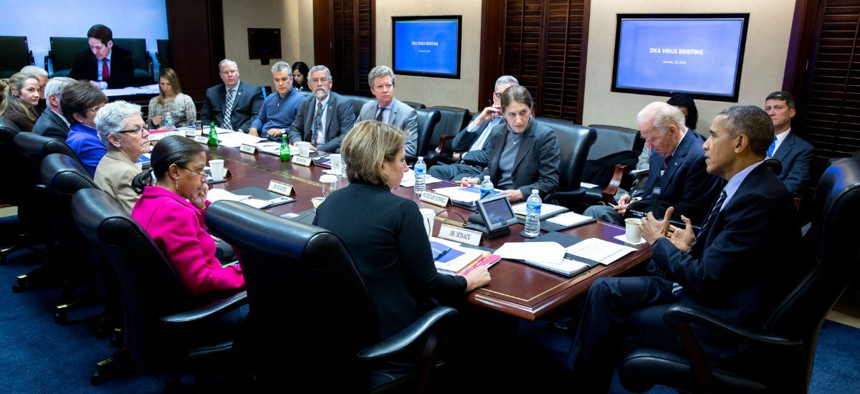
President Obama convenes a meeting in the situation room on the Zika virus. Pete Souza/White House
Obama Mobilizes Federal Agencies to Prevent Spread of Zika Virus
Cases of the virus have been confirmed in the United States.
President Obama has opened several avenues of federal resources to tackle the growing threat of the Zika virus, enlisting agencies to study the mosquito-borne illness and prevent its spread.
Obama met with his health and national security teams on Tuesday, the White House said, where he “emphasized the need to accelerate research efforts” on Zika. He instructed his team to work on diagnostic tests, vaccines and therapeutics, and educational efforts so Americans understand the virus and how to protect themselves. Scientists and health experts have long been aware of Zika, but it only recently spread outside of equatorial regions of Africa and Asia to the Americas.
Zika has infected more than 1 million Brazilians and this week officials in Arkansas and Virginia confirmed cases of the virus in their states. While the virus is usually mild and does not require hospitalization, it has been reported to cause Guillain-Barre syndrome and birth defects, according to the Centers for Disease Control and Prevention.
CDC expanded travel guidelines related to the virus on Tuesday to Central America, South America and the Caribbean. Those areas are now on “alert level two,” meaning travelers bound for those destinations should now “practice enhanced precautions.” The State Department has said it was working closely with CDC on the danger posed by the virus, with a spokesperson noting it was watching the developments “very, very closely.”
CDC also issued new guidelines for evaluating and testing infants -- developed for those born to pregnant mothers who traveled to high-risk areas -- with possible infection. The agency designated the virus as a “nationally notifiable condition,” meaning health care professionals seeing evidence of the illness must report it to their state health department. For now, CDC said, only government entities can properly test for the virus as no commercial tests for Zika are available. Doctors can look for certain birth defects as warning signs for the virus, CDC said.
The agency said the next steps once a diagnosis is confirmed are unclear, but “investigations are ongoing to better understand what services will be most effective for these children as they grow.”
“No specific antiviral treatment is available for Zika virus infections and no vaccine against Zika virus is available,” CDC said.
National Institutes of Health Director Francis Collins promised “far more research” into Zika in a blog post published Tuesday. Collins and Health and Human Services Department Secretary Sylvia Mathews Burwell were present for Obama’s situation room briefing. The NIH chief said the research was “urgently needed.”
“The scientific community must also step up its efforts to develop innovative approaches against the virus,” Collins wrote, “and that’s certainly happening at NIH.”
Collins tapped the National Institute of Allergy and Infectious Diseases to investigate Zika’s effects on the body, how to rapidly identify the virus through diagnostic tests and to increase testing of therapeutics “that might be effective.” NIAID has already identified candidates for Zika vaccines, Collins said.
“All of this work is a compelling example of NIH mobilizing swiftly in the face of a rapidly emerging infectious disease,” he wrote, “and seeking the research answers that Americans and people across the globe need.”
Sen. Jeanne Shaheen, D-N.H., wrote a letter on Wednesday to Burwell, Secretary of State John Kerry and Homeland Security Secretary Jeh Johnson calling for a more direct role from their agencies in addressing the spread of the virus.
“I encourage the federal government to do all it can to support strategies to mitigate the spread of Zika,” Shaheen wrote, “as well as to disseminate new findings and information to the American public.” Specifically, the senator said Customs and Border Protection should enhance monitoring at ports of entry, while HHS should continue to provide information to public health officials and front-line health care workers.
Shaheen complimented the government’s response to Ebola in 2014 and 2015, and urged the agencies to “coordinate efforts to address this challenge with the same urgency.” The lawmaker offered her help as a member of the Appropriations Committee to secure “any additional resources” the agencies might need to “protect our nation from the Zika virus.”
A DHS spokeswoman said DHS does not “have a role yet” in fighting the virus.







